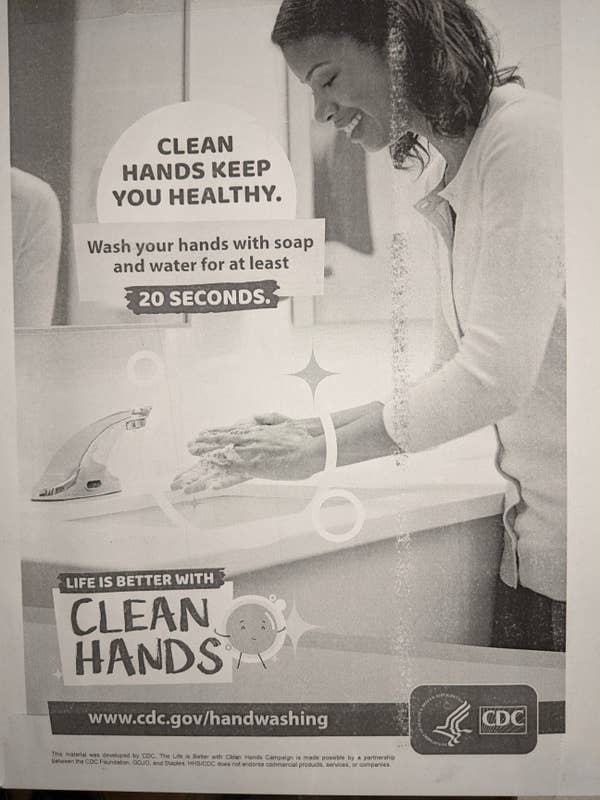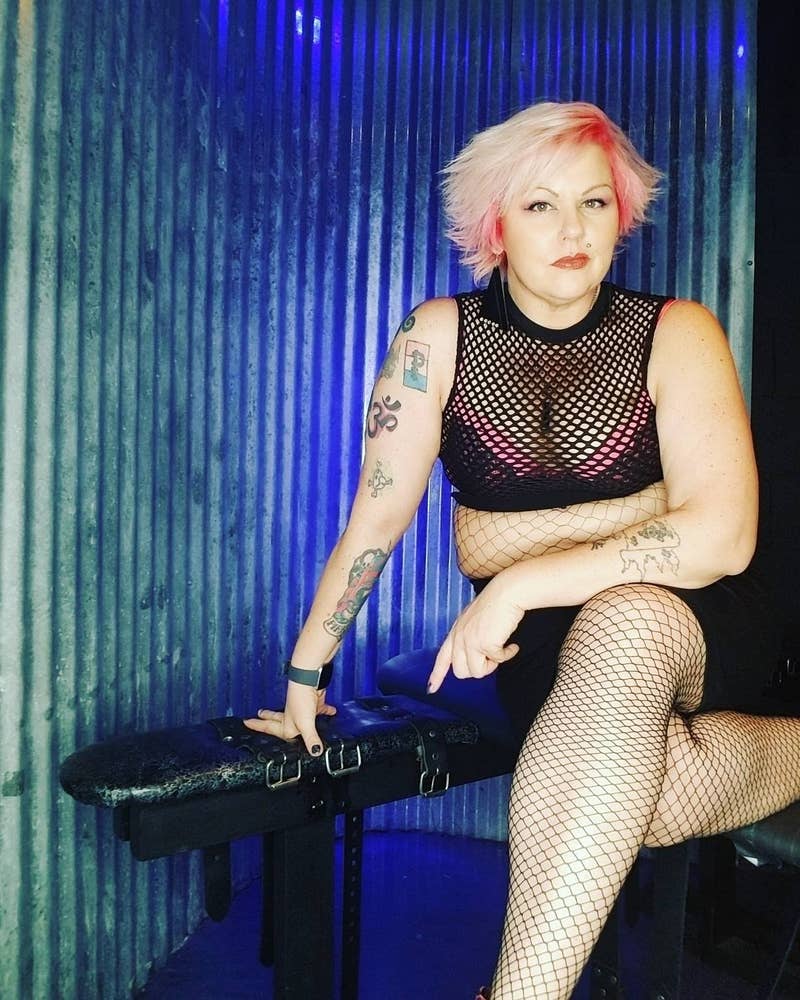Sex Workers Are Facing Increasingly Risky Conditions As The Coronavirus Spreads
Sex workers are losing money because of the coronavirus. Advocates say that means they’re more likely to face exploitation.
Otillia Steadman BuzzFeed News Reporter Posted on March 13, 2020

Courtesy of Jade
Jade, an escort who lives in Austin, said she is asking clients to wash their hands for 30 seconds to protect against the coronavirus.
Sex workers are facing dire financial and personal circumstances as fear of the coronavirus extends into every corner of life, with some under pressure to work in increasingly risky conditions.
Escorts, strippers, dominatrixes, and an intimacy coach told BuzzFeed News they had lost thousands of dollars due to canceled conferences, travel restrictions, and clients’ fears of being in public spaces.
Porn performers have been advised to stockpile video content to release in the event that the industry shuts down, but the most vulnerable sex workers face the threat of exploitation and homelessness.
“Anytime there’s this type of panic,” said sex worker and activist Molly Simmons, “clients understand that as a shift in power.”
As public health departments recommend "social distancing," the sex workers whom BuzzFeed News spoke to explained how they’re planning to continue to support themselves while trying to protect their health in the midst of a global pandemic.
Some said they are turning to online work like sexting and video calls, putting wish lists of food and other goods on Amazon, asking questions about their clients’ travel history, and relying on trusted clients to make ends meet.
But, like the millions of hotel and food service workers in the US with bills and no paid leave, some sex workers said they would simply have to keep working.
“I have a house and a car. I have a mouth to feed. I don’t have time for a stupid virus to stop my money flow,” said Carly, a stripper in Seattle who asked to be identified by her stage name for privacy reasons.

Courtesy of Carly
Carly, a stripper who works in Seattle where there have been the highest number of cases in the US so far.
In Seattle, which has recorded the most cases of the coronavirus so far in the US and where schools have closed, sex workers said they’ve already seen a dramatic drop in business.
Lady A, a dominatrix in the city, said she’s been losing at least $500 a week since concerns about the virus hit, and that the three women she shares a workspace with have faced the same. “We would usually do, say, three clients per day in that space,” Lady A, who asked to be identified by her professional pseudonym to maintain her privacy, told BuzzFeed News.
“This last weekend we would usually have been booked, but it was open. So that’s pretty bad,” she said.
Malice Amarantine, who works as a stripper in Seattle, said she has had nights where she went home empty-handed, and that she barely made rent last month. “I made the last two dollars I needed on the fifth of the month,” she said, adding that that had never happened before.

Courtesy of Malice Amarantine
Amarantine said that concerns about the virus had affected the service industry broadly in the city, but that she felt sex workers had been hit particularly hard.
This is partly due to the perception that strip clubs are dirty, Amarantine told BuzzFeed News. “In general, strip clubs are suffering a little bit more because even though it’s totally untrue, they’re seen as being grimy places. So I think there’s just this perception of them being more high risk,” she said.
Amarantine said that while some strip clubs might deserve the bad reputation, most clubs clean aggressively, and that strippers themselves are obsessed with Purell.
“Strippers are some of the cleanest people because we have to smell good to make money,” she explained. “We all carry hand sanitizer in our purses, and we always have.”

Courtesy of Malice Amarantine
A poster advising that people wash their hands for at least 20 seconds at the strip club where Malice Amarantine and Carly work.
She said she had so much hand sanitizer, in fact, that even in the midst of people panic-buying the disinfectant, she didn’t expect to run out anytime soon. “Our club actually has hand sanitizer there, and it’s still there. I already have one in my purse, there’s one in my kitchen, I have one I keep in my car, so I’m not running out anytime soon,” she said.
River, an escort based in Alaska, who spoke to BuzzFeed News on Twitter and only gave her professional name, compared the current environment to the financial crash in 2007 and the passage of FOSTA-SESTA, a 2018 federal law that restricted content related to selling sex online, and said that she didn’t expect to work until the crisis had subsided.
She said she had learned to save for tough times, but would still probably have to put her taxes on her credit card. “In sex work you have to save and be ready, because when you need money is when you start letting your safety practices slip,” she said.
River, who was traveling in Europe when she first spoke to BuzzFeed News, said she had changed her return flight after Trump announced travel restrictions, and that she would self-quarantine at home. She said she had made a quarantine wish list on Amazon and said some clients have been sending her supplies. “These sweeties bought me like 12lbs of dried cherries, 2lbs of dried blueberries, and 25lbs of rice so far!” she said.
In Austin, where the cancellation of SXSW has already caused layoffs and hurt the local economy broadly, intimacy coach and sex educator Sasha Rose said she has been forced to cancel naked yoga, play parties — where partygoers can have sex or watch others in a safe space with sex-positive ground rules — and a big event with a panel discussion she was planning on the sidelines of SXSW for a friend’s book launch.
Rose said clients would normally complain about event cancellations, but that she hadn’t heard from anyone this time around. She’s not so upset about it herself — “I don’t want to kiss anybody,” she told BuzzFeed News.
Jade, an escort in Austin who asked to be referred to by her porn persona to protect her identity, said she was continuing to see clients, but was nervous because she has a few clients who travel regularly to Houston and San Antonio, where there had been confirmed cases of COVID-19, the disease caused by the coronavirus. She said she has gotten more serious about asking clients to wash before she sees them.
“Most people are showered or they come in and shower, but I don’t always ask them to go wash their hands right when they come in,” said Jade. But since the spread of the virus, she said she’s been stricter. “I’m like, ‘stay at the sink for 30 seconds.’ Some people turn the water on, and it’s often 5 seconds, and I’m like, 'you didn’t wash your hands,'” she said.

Courtesy of Sasha Rose
Rose, the sex educator, and other sex workers told BuzzFeed News that they’re relying on online sessions with clients to keep some money coming in while they wait for the spread of the virus to slow down and public fear to subside.
“I work with people on intimacy and relating in trauma. I teach somatic processing,” said Rose, referring to an alternative therapy for people dealing with PTSI. “So I’m focusing on that area. It makes me a lot less money,” she said.
Madame Rose, a dominatrix based in LA, said she’s actually seeing some clients more regularly through online sessions, which include tasks and instructions built around what a client likes. “A couple of regulars ... have requested more video sessions than I would normally see them face to face,” she said. “It’s interesting.”
Despite the video calls, she said the situation has declined rapidly and she’s still losing money overall. “I’ve definitely lost some money. I wouldn’t say it’s catastrophic numbers yet, but enough to feel the impact. It’s made me feel that I need to boost my video and clips production so that I can continue to make money.”
Bella French, the CEO of cam site ManyVids, told BuzzFeed News that although she decided to cancel upcoming photoshoots and travel for her staff, the site was doing well.
“Our sales are doing really really good. I feel like it’s almost benefitting the adult industry,” French said. “I think people stay home more, some maybe they’re a little more bored than usual, so maybe they consume a little bit more than they would.”
French also made a point to note that she thought headlines about porn videos tied to the fantasy of the coronavirus were “fake news,” and explained that it’s a common marketing strategy for porn sites to get more clicks. “I talked to my data science team,” French said, “We didn’t see any influence of that on ManyVids.”
The Free Speech Coalition (FSC), a porn industry trade association that oversees an STI screening program for porn performers, recommended that performers stockpile videos to release in the event that porn sets are shut down.
Mike Stabile, who is the communications director for the FSC, told BuzzFeed News that this was the first time in memory that the industry had discussed a shutdown for something that was not an STI. The FSC administers a system called PASS, which records the results of biweekly tests that performers are required to get. If someone passes, they get a green check, but if they skip the test or they fail, they get a red X. In the event of a shutdown, everyone’s results show a red X, meaning no one is cleared for work.
Stabile said the FSC is not expecting a shutdown at this point, but in a statement put out Friday, the FSC advised performers and producers to begin actively planning for one, and said individual performers should make their own choices about whether or not to continue shooting. In addition to standard protections for health, the FSC also suggested performers and studios make more videos now so they would have new content to release if the virus did eventually cause a widespread shutdown or performers get sick. “The last thing you want in a situation like this is a financial incentive for people to go on set when they’re not feeling well.”
For the most vulnerable, though, there are few alternatives, and the diminishing client base only puts sex workers at further risk, said Simmons, who is based in Brooklyn.
Simmons, along with her co-chapter representatives at the Brooklyn chapter of the Sex Worker Outreach Project (SWOP), established a GoFundMe campaign to provide crisis relief for sex workers dealing with increasing financial strain, and is putting together resource guides to help people access social services.
“When work is really scarce and everybody is really worried about their money, there are some clients,” said Simmons, “who try to take advantage of that.”
“They will push for lower prices, they will push for not having to screen, they will push for unsafe work practices — whether that’s bareback or meeting someone you don’t know or meeting in an unsafe location or being forced to push your own personal boundaries of what you’re willing to do,” she explained. “Because they know that workers are really desperate for money.”
A fund similar to the one SWOP Brooklyn has created has been established in Seattle, and No Justice No Pride, a mutual aid organization that supports the transgender community in DC, was also taking donations to provide supplies to trans people and sex workers, saying, “we are concerned about how the spread of COVID-19 may affect work environments for sex workers.”
The virus, which lives in the upper respiratory system, poses yet another risk for sex workers.
Dr. Peter Meacher, the chief medical officer at Callen-Lorde Community Health Center in New York City, said that although there’s still a lot we don’t know about the coronavirus, we do know that it primarily spreads through droplets transmitted into the air by coughing and sneezing.
Meacher said kissing posed a particular risk. “You are at risk of exposure to COVID from each person you’re having that type of contact with. And whilst we think people are most infectious when they have symptoms — the symptoms again, this is an important message to get out, specifically, cough and fever — we honestly don’t really know about the days before symptoms,” said Meacher, speaking over the phone.
Sex workers face different degrees of risk depending on what they’re doing, said Chuck Cloniger, clinical director at the St. James Infirmary, which provides clinical and social services to sex workers in San Francisco.
“People who are doing street-based sex work, may not be able to stop doing sex work to survive,” said Cloniger.
For people who trade sex to survive and other sex workers who continue to see people in person, Cloniger recommends a discussion with clients ahead of time to ask the same questions about recent travel and other risk factors that doctors may be asking. Meacher, at Callen-Lorde, also emphasized that handwashing was an important step for everyone.
Madame Rose, the LA-based dominatrix, said she has already implemented this, adding some health-related questions to the prescreening she does with clients.

Courtesy of Madame Rose
Madame Rose, a dominatrix in Los Angeles, said she's losing money and trying to make up for lost income with videos.
“If somebody did show up for a session and they were wheezing and dripping and coughing I would definitely send them home, because that would be violation of my consent at that point,” said Rose.
But Simmons, the sex worker and activist, said that for the most vulnerable sex workers that advice missed the point. “Without any adequate connection to government services to help people stay alive — literally stay alive — people don’t have any other option but to continue to do what they’ve always done," she said.
Ruth Morgan Thomas, who advocates for sex worker rights around the world, argued that the health crisis was also exacerbated by criminalization of sex work, which limits sex workers’ ability to access health care and other social services. “For me, this just amplifies the vulnerabilities [that result from] criminalization and the refusal of many governments to recognize sex workers as part of the labor force in the country,” said Morgan Thomas, adding that it “somehow makes people feel we have less rights to the social protection systems that others have.”
Amarantine, who works as a stripper in Seattle, said that she has health care coverage through the state due to an accident a few years ago. She agreed with Morgan Thomas, adding that lack of rights and access to health care for sex workers and others in the service industry puts the broader community at risk too.
“It trickles up hill, I guess you could say. I wish more people understood,” she said.
Carly, who works with Amarantine, said she’s relying on her training as a certified nurse assistant to stay healthy during the pandemic because she doesn’t currently have health insurance. “I did last year because of my other job...” she said. “Knock on wood.”●
No comments:
Post a Comment